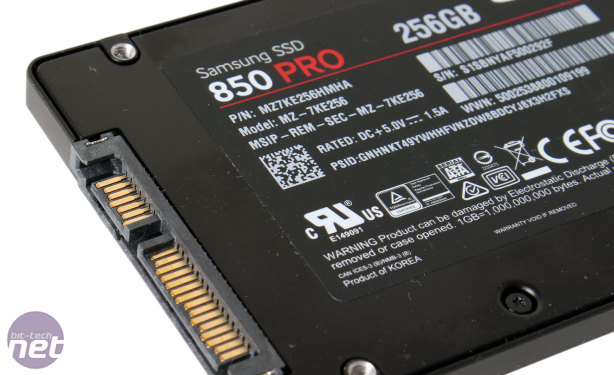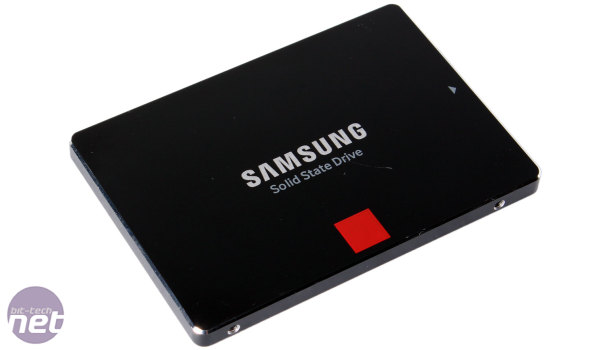
Performance Analysis
Sequential performance is one of the less interesting components of SSD performance thanks to current SATA 6Gbps limits being reached by most, but nevertheless the SSD 850 PRO does very well. It has the fastest read results in both AS SSD and CrystalDiskMark (CDM) and almost the best writes in both too.Samsung reported that 4K random reads at queue-depth of 1 (QD1) were only marginally faster than SSD 840 PRO, and that's indeed the case in both AS SSD and CDM. The 840 EVO drives actually have a slight upper hand here, but otherwise the 850 PRO is faster than anything else. As for QD1 random writes, the SSD 850 PRO emerges as 3 and 4 percent quicker than its predecessor in AS SSD and CDM respectively. In both cases, the current Crucial drives are a little faster and the OCZ ones slightly more ahead, but the differences are small.
Moving to the high queue-depth tests, Samsung's random read performance remains undefeated, with huge results of 384MB/sec in AS SSD and 407MB/sec in CDM. Random writes are, as Samsung reported, exactly on par with the SSD 840 PRO, which is again no bad thing. The OCZ drives just manage to steal victory in both benchmarks, but the differences are so small that they'll only ever be relevant to benchmarks.
The trace-based PCMark 7 benchmark reports the SSD 850 PRO as actually being around 5MB/sec slower than the SSD 840 PRO in the Starting Applications Workload, which also leaves the recent Toshiba HG6 SSD room to inch ahead. Again though, we're dealing with small differences, and compared to the rest of the pack the SSD 850 PRO is further ahead. Meanwhile, Samsung's new SSD sets a new record in the Gaming workload of 167.8MB/sec, trumping the SSD 840 PRO by about 8MB/sec and trumping everything else (excluding the Toshiba drive) by at least 28 percent. It also casually dances to the top of the Windows boot time test, with its average time of 11.30 seconds again beating everything else.
Finally, we come to our Iometer mixed workloads, which are particularly relevant to this prosumer focussed SSD. While this isn't a long term consistency benchmark given that each test only runs for five minutes, there is still a tonne of write activity and success here relies on an SSD having a versatile controller and the ability to maintain speed after numerous writes, which is an area that the SSD 840 PRO wasn't always as dominant in.
The situation has vastly improved with the SSD 850 PRO. In the database workload, the SSD 850 PRO secures another top spot, narrowly beating the OCZ Vector 150 and improving upon the SSD 840 PRO score by over 50 percent. It's a similar story in the Workstation workload, where again the new drive claims top spot and beats the SSD 840 PRO, this time by 56 percent. Both of these workloads use the same file size throughout, but the File Server workload, which has both read and write operations with many different file sizes, is a little more troublesome for the SSD 850 PRO. To be clear, it still improves on the SSD 840 PRO, but here “only” by 26 percent. Its score of 33,293 IOPS is high, but it's narrowly beaten by the Crucial drives, and more significantly beaten by the Toshiba HG6 and OCZ Vector 150. Nevertheless, in the read-only Web Server workload, which also utilises numerous file sizes, the SSD 850 PRO regains dominance with a score of 32,157 IOPS, again highlighting its excellent high queue-depth read performance.
We also did some tests with the new RAPID Mode enabled. We decided not to include these results in the graphs because we didn't want to skew the results and also because we didn't want to paint an unrealistic picture of its performance since RAPID Mode depends heavily on the specific task at hand. Nevertheless, the results were ridiculously fast, with sequential reads and writes reaching almost 8GB/sec and almost 6GB/sec respectively in CDM. This is much faster than we saw with RAPID Mode on the SSD 840 EVO, though random read and writes improved by similar levels (still a lot). We also saw ludicrous scores of 628.71MB/sec and 371.43MB/sec in our PCMark 7 Starting Applications and Gaming workloads respctively. Essentially, advice regarding RAPID Mode remains the same, in that there's very little reason not to activate it.

MSI MPG Velox 100R Chassis Review
October 14 2021 | 15:04










Want to comment? Please log in.